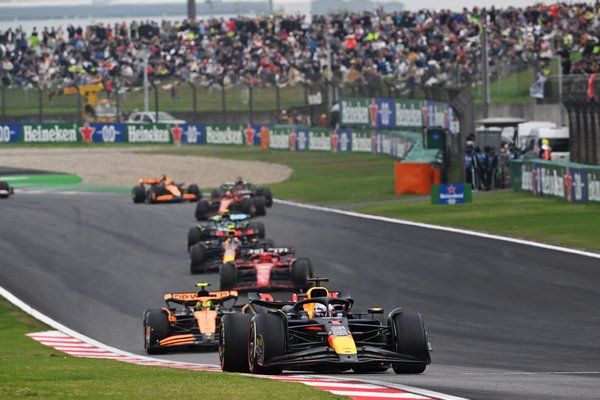The Full FIA Announcement on the 2004 Rules
Following its meeting with Team Principals in Imola on 17 April, the FIA held a further six-hour meeting with both Team Principals and Team Technical Directors in London on 29 April. This meeting resulted in unanimous agreement by the teams on a number of points. The President of the FIA confirmed that provided the teams are unanimous, he could not imagine circumstances in which the FIA would not agree to their proposals.

Following its meeting with Team Principals in Imola on 17 April, the FIA held a further six-hour meeting with both Team Principals and Team Technical Directors in London on 29 April. This meeting resulted in unanimous agreement by the teams on a number of points. The President of the FIA confirmed that provided the teams are unanimous, he could not imagine circumstances in which the FIA would not agree to their proposals.
Electronic driver aids
All the teams and the FIA signed the following statement:
The teams unanimously agreed to a complete ban on automatic gearboxes and launch control for 2004. The teams were able to demonstrate that the elimination of traction control would involve very significant additional costs for all teams and engine manufacturers. The teams therefore unanimously requested the FIA not to proceed with a ban on traction control for 2004. The FIA agreed on the clear understanding that this would enable the engine manufacturers to supply the independent teams with engines at a fully affordable cost having regard to the current business climate. The FIA agreed that, provided engines are supplied on this basis, these arrangements will remain in place indefinitely.
The FIA also agreed to allow pit lane speed limiters to continue and to examine the possibility of allowing electronically controlled power steering.
Telemetry
Although pit-to-car telemetry remains banned, the teams unanimously requested the FIA to withdraw its opposition to car-to-pit telemetry. They were able to show that the benefits outweighed the costs. The FIA agreed.
Engines
It was confirmed that each driver would use one engine for the entire race weekend (ie fitted fresh for Friday) and that use of a further engine would result in losing ten places on the grid.
The FIA stated that if fully affordable engines were indeed available to all teams from 2004 onwards, the proposals for multi-race engines in 2005 and 2006 would be withdrawn.
Radios
Teams will continue to use their own radio systems in 2004 and beyond, provided:
they are stand-alone;
they cannot transmit data;
the FIA is given free access to the voice transmissions. Any commercial exploitation of these voice transmissions will be a matter for the teams and the Commercial Rights Holder.
Bodywork
Engine covers and rear wings will be modified for 2004 and 2005;
only two upper rear wing elements will be permitted in 2004 and 2005;
Track tests will be carried out with a standard rear wing before making any decision for 2006;
Proposed alternatives to a standard rear wing will be invited with a view to having a package which also produces Monza levels of downforce and Interlagos levels of drag;
The 2006 bodywork regulations will be finalised by the end of 2003;
The TWG will be asked to discuss the possible elimination of the side pod winglets.
Extreme-weather tyres
The two tyre companies will be invited to make extreme-weather tyres available;
The sea/land ratio and tread depth will be specified by the FIA and these tyres will only be used when authorised by the race director;
The FIA will ensure that a single wet-weather tyre capable of being used effectively even on a very wet track is clearly defined within the regulations for 2004.
Standard brake materials
The TWG will be asked to draft a material specification to be included in an FIA invitation to tender for the supply of standard brake friction materials in 2004;
Standard skid block materials
The TWG will be asked to draft a material specification to be included in an FIA invitation to tender for the supply of a standard skid block material in 2004;
Qualifying procedures
In 2004 cars will continue to be required to start the race with the same quantity of fuel as they had at the end of the final qualifying session.
Post-qualifying parc ferme
Unless an equally effective means of ensuring that cars are raced exactly as they qualified is proposed and agreed, post-qualifying parc ferme procedures will remain the same in 2004.
Spare cars
Each team will nominate the two cars it intends to use during qualifying before the session starts;
Use of spare cars will be restricted in accordance with the event procedures issued in Imola (dated 17.4.03) but if a spare is used during qualifying it must have the same fuel load as the original car;
As a consequence of the above, teams will be permitted to add or drain fuel from spare cars during qualifying under supervision of the scrutineers.
Be part of the Autosport community
Join the conversationShare Or Save This Story
Subscribe and access Autosport.com with your ad-blocker.
From Formula 1 to MotoGP we report straight from the paddock because we love our sport, just like you. In order to keep delivering our expert journalism, our website uses advertising. Still, we want to give you the opportunity to enjoy an ad-free and tracker-free website and to continue using your adblocker.













Top Comments